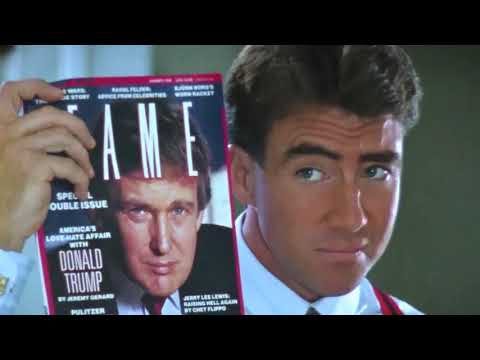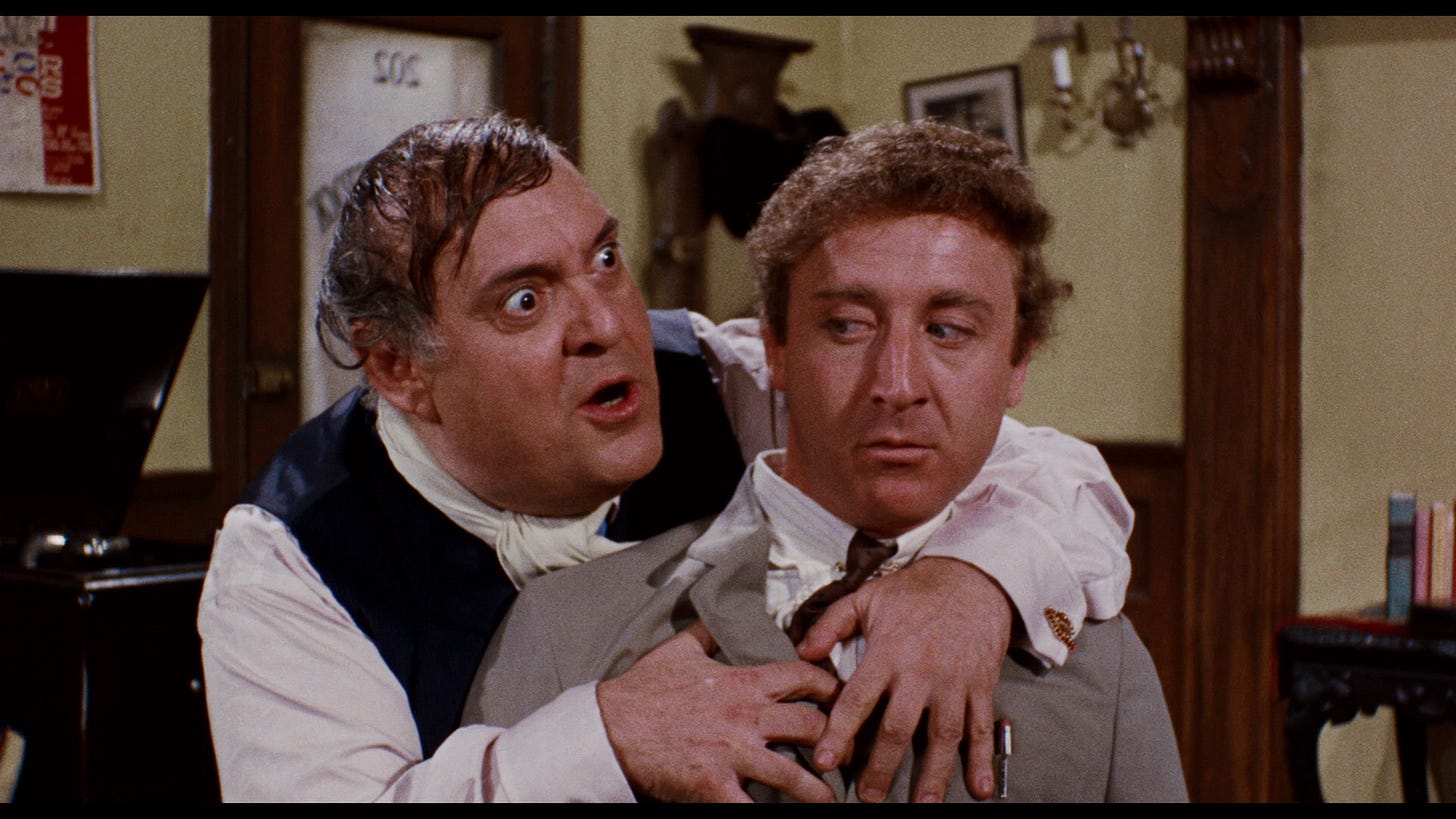[P1] Be Kind, Rewind and Then Misrule: How VHS Rentals Educated Trump
What I learned from Trump's old Blockbuster membership card
"Welcome to Part [1] of my post series 'Be Kind, Rewind and Then Misrule: How VHS Rentals Educated Trump'. Here, I dissect how a self-proclaimed 'very stable genius' seems to have mistaken Hollywood schlock for Harvard lectures. Grab your popcorn as we fast-forward through four years of an administration that treated governing like a poorly-scripted straight-to-video sequel, proving that you can learn everything about running a country from your local video store. Who would have fecking guessed?"
[Update: here is an audio review of this article]
The Art of the Family Business: Making America an Offer It Can't Refuse
Movie: The Godfather (1972)

Character: Vito Corleone (Actor, Marlon Brando). Quote: "A man who doesn't spend time with his family can never be a real man."
Character: Donald J. Trump (Actor, Donald J. Trump). Quote: "I've always said, it's very hard for a person who is very successful in business to run for political office."
In a twist that would make Mario Puzo reach for his typewriter, Trump's presidency seemed to draw inspiration from "The Godfather" – if the film had been reimagined as a how-to manual for running the White House rather than a cautionary tale about the corrupting influence of power.
Much like the Corleone family's stranglehold on their criminal empire, Trump's administration appeared to operate on a strict "family and friends" policy, turning 1600 Pennsylvania Avenue into the ultimate family business.
Picture, if you will, Trump sitting behind the Resolute Desk, not unlike Don Vito dispensing favors on his daughter's wedding day. Instead of a cat, he's stroking his oversized tie as he mumbles about loyalty and making deals.
One could almost hear the collective gasp of ethics watchdogs nationwide, their exasperation echoing the frustration of Tom Hagen trying to explain the concept of "conflict of interest" to a boss who sees nepotism as a virtue.
The film's exploration of power consolidated through a network of favors and threats found its Trumpian equivalent in a revolving door of cabinet members and advisors, each seemingly cast more for their loyalty than their qualifications.
As if channeling the spirit of the Corleone family consigliere, Trump appeared to value personal allegiance above all else, turning "You're fired!" from a reality TV catchphrase into a governing philosophy. Who needs a deep state when you can have a family state?
As the presidency unfolded, the parallels to the film became increasingly uncomfortable. The tension of Michael's transformation from reluctant outsider to ruthless Don was replaced by the real-world spectacle of Ivanka and Jared's metamorphosis from Manhattan socialites to White House power brokers.
Instead of "I believe in America," we got "Make America Great Again" – both powerful slogans masking a darker reality.
In the movie's most iconic scene, Don Vito explains, "I'm gonna make him an offer he can't refuse." In our reality TV version, we watched as Trump seemed to extend the same philosophy to governors, foreign leaders, and even his own party, leaving us to wonder if "quid pro quo" had replaced "E pluribus unum" as the nation's motto.
As this political gangster epic continues to unfold on the world stage, one can't help but wonder: If this is our generation's "Godfather," have we all been cast as unwitting extras in a democracy's descent into a family-run fiefdom?
In a world where the line between public service and family business has been blurred beyond recognition, are we all just one loyalty oath away from finding a horse's head in our bed? And more importantly, when the credits finally roll on this administration, will we find ourselves longing for the relative simplicity of a time when "draining the swamp" didn't mean refilling it with your own relatives?
Mindful moviegoers, though we've scripted this satire with silver screen flair, the unedited footage of consequences of turning the highest office in the land into a family dynasty in our America can't be left on the cutting room floor.
As we approach future elections, let's not forget that in the real world, the Don of Pennsylvania Avenue shouldn't be making offers we can't refuse – because in a true democracy, it's the people who should be calling the shots.
The Art of the Bankruptcy Deal: When Greed Is Good, but Credit Is Better
Movie: Wall Street (1987)
Character: Gordon Gekko (Actor, Michael Douglas). Quote: "Greed, for lack of a better word, is good. Greed is right. Greed works."
Character: Donald J. Trump (Actor, Donald J. Trump). Quote: "I've used the laws of this country to pare debt... We'll have the company. We'll throw it into a chapter. We'll negotiate with the banks. We'll make a fantastic deal. You know, it's like on 'The Apprentice.' It's not personal. It's just business."
In a financial twist that would make Oliver Stone reach for his blue-chip stocks, Trump's business acumen (and by extension, his presidency) seemed to draw inspiration from "Wall Street" – if the film had been reimagined as a how-to guide rather than a cautionary tale about the perils of unchecked avarice. Much like Gordon Gekko's philosophy that greed is good, Trump appeared to operate on the principle that bankruptcy is even better, turning financial failure into a perverse art form.
Picture, if you will, Trump standing in a gilded boardroom, not unlike Gekko addressing the stockholders of Teldar Paper. Instead of "Greed is good," we got "Debt is tremendous." One could almost hear the collective gasp of economists nationwide, their exasperation echoing the frustration of a bankruptcy judge trying to make sense of a balance sheet where red is the new black.
The film's exploration of financial manipulation and corporate raiding found its Trumpian equivalent in a business career that seemed to treat Chapter 11 as a get-out-of-jail-free card. As if channeling the spirit of Gekko's protégé Bud Fox, Trump appeared to view every business venture as a potential pump-and-dump scheme, where the name on the building was worth more than the building itself. Who needs to repay creditors when you can just declare bankruptcy and start over?
As Trump's business career unfolded, the parallels to the film became increasingly uncomfortable. The tension of insider trading in the movie was replaced by the real-world spectacle of a businessman-turned-president refusing to divest from his companies. Instead of "Blue Horseshoe loves Anacott Steel," we got emoluments clauses and foreign diplomats suddenly developing a keen interest in Trump hotel vacancies.
In the movie's climactic moments, we see the consequences of unchecked greed catching up with the characters. In our reality TV version, we watched as a man with a string of business failures somehow failed upwards into the highest office in the land, leaving us to wonder if the American Dream had become a pyramid scheme.
As this financial thriller continues to play out on the world stage, one can't help but wonder: If this is our generation's "Wall Street," have we all been cast as unwitting shareholders in Trump Inc., our national fortune tied to a business model that makes Ponzi look like a paragon of fiscal responsibility?
In a world where a man can bankrupt a casino and still be considered a financial genius, are we all just one leveraged buyout away from turning the country into a junk bond? And more importantly, when the balance sheet of this administration is finally tallied, will we find ourselves longing for the relative simplicity of the S&L crisis?
Remember, dear readers, while we may chuckle nervously at these cinematic parallels, the consequences of treating the nation's economy like a high-stakes poker game are no laughing matter.
As we navigate future elections and economic policies, let's not forget that in the real world, unlike in the movies, there's no final scene where the the FBI swoops in to arrest the bad guys.
The glorification of greed and financial recklessness isn't just a plot device – it's a direct threat to the economic stability of millions of Americans. And unlike Gordon Gekko, we can't simply fade to black when the bill for our excesses finally comes due.
Springtime for Trump: The Tax Return That Went Too Right
Movie: The Producers (1967)
Character: Max Bialystock (Actor, Zero Mostel). Quote: "I want everything I've ever seen in the movies!"
(Fire and Fury, Michael Wolff). Quote: "Shortly after 8 p.m. on Election Night, when the unexpected trend — Trump might actually win — seemed confirmed, Don Jr. told a friend that his father looked as if he had seen a ghost. Melania was in tears — and not of joy."
In a theatrical farce that would make Mel Brooks break into a chorus of "Prisoners of Love," Trump's dance around his tax returns seemed to draw inspiration from "The Producers" – if the film had been reimagined as a guide to financial opacity rather than a hilarious romp about Broadway chicanery.
Much like Max Bialystock and Leo Bloom's scheme to profit from a flop, Trump's refusal to release his returns appeared to be a high-stakes gamble that transparency was overrated, leaving many to wonder if we were all unwitting investors in a political production where "creative accounting" had replaced "public accountability."
Picture, if you will, Trump at a press conference, not unlike Max Bialystock courting little old ladies for investments. Instead of "When You've Got It, Flaunt It!" we got a never-ending audit and promises of "beautiful" tax returns, always just out of reach.
One could almost hear the collective groan of tax attorneys nationwide, their exasperation echoing the bewilderment of the audience watching "Springtime for Hitler" become an unexpected hit.
The film's exploration of a scam that goes horribly right found its Trumpian equivalent in a tax return saga that seemed to operate on the principle that if you stonewall long enough, people might just stop asking.
As if channeling Bialystock's flair for financial sleight-of-hand, Trump appeared to view his tax returns as his own personal "Springtime for Hitler" – a potential disaster best kept under wraps. Who needs transparency when you can have tremendous mystery?
As the tax return controversy unfolded, the parallels to the film became increasingly surreal. The tension of Bialystock and Bloom waiting for their show to flop was replaced by the real-world spectacle of a nation waiting for tax returns that never seemed to materialize.
Instead of "Where Did We Go Right?" we got "Where Did Those Returns Go?" One could almost imagine Trump, like Max and Leo dancing with glee at their apparent success, celebrating each day his returns remained hidden from public view.
In the movie's most iconic scenes, we see the producers' panic as their sure-fire flop turns into a hit. In our reality TV version, we watched as the mystery surrounding Trump's finances seemed to only bolster his image among supporters, leaving us to wonder if "show me the money" had been replaced by "don't show me anything" in the political lexicon.
Perceptive patrons, while we've rolled out this red carpet of ridicule, the true premiere of financial transparency in our political theater calls for more than mere applause or critique.
As this Broadway approach to presidential finances continues to play to packed houses on the world stage, one can't help but wonder: If this is our generation's "The Producers," have we all been cast as reluctant backers in a political production where the books are cooked but the reviews are still raves?
In a world where a president can indefinitely defer financial disclosure, are we all just one creative tax scheme away from seeing the IRS replaced by a chorus line? And more importantly, when the final curtain falls on this administration's fiscal follies, will we find ourselves longing for the relative simplicity of a time when the biggest financial scandal on Broadway was a musical about Hitler?
As we navigate future elections and inevitable questions of financial propriety, let's not forget that in the real world, unlike in satirical musicals, there's no convenient Swedish policeman to arrest us when the scheme falls apart.
The true production isn't on any stage – it's in the erosion of norms that ensure our leaders are working for the people, not profiting from them. In the grand theater of American democracy, perhaps it's time we all asked ourselves: Are we content to be a captive audience, or do we dare to demand an encore of transparency?
In Part 2 - From Duck Soup to Covfefe: Trump's Foreign Policy Blockbusters, Breaking Fake: When Trump Hijacked the Media Narrative, The White House of Horrors: Trump's Domestic Policy Nightmares, Apocalypse, Now What? Trump's Military Misadventures Go Hollywood & off course the really crappy straight to VHS policies that made foreign leaders including the Queen of England gasp in disgust.
All that and more, including the classics ‘Escape from New York’, ‘The Driller Killer’, ‘Death wish 2000’ and much, much more…. ;-)
Thanks for reading! Hope this article gave you a chuckle or two.
Enjoyed the content? There are a few ways you can show your appreciation:
1. Free Subscriber: You're awesome! All content remains free for you. Forever.
2. Supporter: Your choice to support empowers writers and fuels creativity.
3. Founding Member: You're a champion of our mission, ensuring writers thrive.
Don’t want to subscribe? No worries! You can still...
Remember, every contribution, while optional, is invaluable. You're not just funding content, you're nurturing a community of fellow 'That's Fecking Nuts' enthusiasts! Have a nice day ;-)










Johnny!
Fecking FABULOUS!!! Yes, this gave me some chuckles, but also some pretty serious wide eyes! You hit this one perfectly! Incredibly relatable and insightful as I found unnerving parallel to a large portion of my own family (ride or die MAGAS) and their 1990's all in dive to MORE THAN ONE failed pyramid scheme, yet always assured 'this is not a pyramid scheme'. They just couldn't seem to get enough of them. You raised the curtain for me with this:
"In the movie's climactic moments, we see the consequences of unchecked greed catching up with the characters. In our reality TV version, we watched as a man with a string of business failures somehow failed upwards into the highest office in the land, leaving us to wonder if the American Dream had become a pyramid scheme."
Incredibly revealing for me of just how they could throw ALL of themselves behind such a conman as DJT. Living out their fantasies of "getting RICH", yet falling for a too-good-to-be-true CON and having it fizzle out to financial losses they don't dare talk about!" Wow!
This new piece and the movie connections are spot on! Loved it! This is why I am a fan of yours!💜